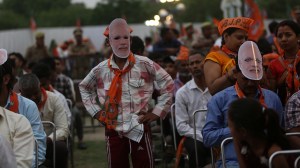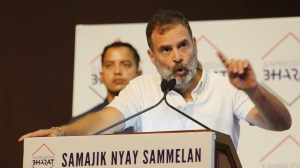- India
- International
View from the right: Pakistan Postmortem
An editorial in the Organiser also chimes in: “Pakistan is a fuming like volcano and the general proposition that a ‘peaceful and democratic Pakistan [is] useful for India’ looks a distant dream”.
Pakistan Postmortem
Even before the euphoria over Pakistani Prime Minister Nawaz Sharif’s visit to Narendra Modi’s swearing-in ceremony subsides, the terror strike at Karachi airport has got the Sangh Parivar’s Panchjanya cautioning about the dangers lurking in neighbouring Pakistan. “The army is a looming shadow working from behind the curtains in Pakistan. Infamous as the establishment, fear of it is ubiqutous… The demon of Taliban’s terror is created by this establishment,” its cover story claims. An editorial in the Organiser also chimes in: “Pakistan is a fuming like volcano and the general proposition that a ‘peaceful and democratic Pakistan [is] useful for India’ looks a distant dream”.
Other articles in the Organiser, however, make contradictory suggestions over India’s engagement with global powers — the US, Japan and China — in the national interest. An editorial suggests that “China and the US are already competing for engagement and balancing these power centres will be a difficult task for the new government”. A separate analysis argues that “we have to develop a strategy of cultivating short-run friendship with the US while making long-term partnership with China. It is like buying technology from the US but making a joint venture with China”. Yet another article equates the US’s strained outlook towards Modi and China’s similar outlook towards Japanese leader Shinzo Abe to advocate that India-US-Japan to form a “troika” against Chinese belligerance. It suggests striking “‘business-like’ relations with Beijing” while forging a “much-closer bilateral diplomatic embracement with Tokyo”.
New Deal
Both weeklies describe the first few weeks of the Modi government as instilling “a ‘new hope’ in the masses”.
“The capital has its own power centres and there is a larger perception about lobbies working in various ministries. Modi has already taken steps to curb the roles of intermediaries in the government functioning,” an editorial in the Organiser says, welcoming the “ambitious but achievable action plan” outlined by the new government. One story describes the Modi government’s promises, made via the president’s speech, as a “roadmap of positive hopes”. A report in Panchjanya highlights the changing work culture in the bureacracy after Modi’s swearing-in to imply that the lethargy that set in during the UPA regime is set to be discarded.
Seminal Words

While the mainstream media underplayed Prime Minister Narendra Modi’s invocation of “1,200 years of slavery” during his speech in reply to the discussion on the motion of thanks on the president’s speech, the Organiser has sought to highlight its import with a full-page article describing them as “seminal words” spoken without any “political appeasement”.
“The key phrase was 1,200 years of slave mentatlity, on which he emphasised while presenting his points,” the Organiser article has underlined: “For years, India has grown up on the hard fact of ‘slavery of 200 years’, which refers to the period that the country was under the British rule”. The article stresses that “the phrase assumes significance now as he is the prime minister of the country”.
“By expanding it to 1,200 years… is PM Modi trying to bring about a paradigm change in the way we percieve our history?” asks the article, adding quotes from a historian associated with the Vivekananda International Foundation to declare that the prime minister only stated
a “historical fact”.
EXPRESS OPINION
Apr 25: Latest News
- 01
- 02
- 03
- 04
- 05










































